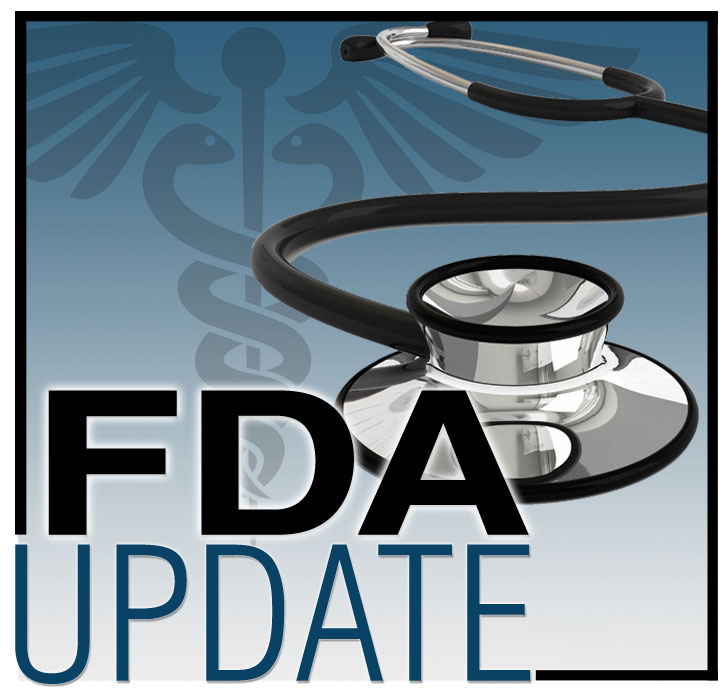FDA Approves Durvalumab for Urothelial Carcinoma Treatment

On May 1, 2017, the U.S. Food and Drug Administration granted accelerated approval to durvalumab for the treatment of patients with locally advanced or metastatic urothelial carcinoma who have disease progression during or following platinum-containing chemotherapy or who have disease progression within 12 months of neoadjuvant or adjuvant treatment with platinum-containing chemotherapy.
The FDA also approved the VENTANA PD-L1 (SP263) assay as a complementary diagnostic for the assessment of the PD-L1 protein in formalin-fixed, paraffin-embedded urothelial carcinoma tissue.
Approval was based on one single-arm trial of 182 patients with locally advanced or metastatic urothelial carcinoma whose disease progressed after prior platinum-containing chemotherapy. Durvalumab, 10 mg/kg via IV, was administered every two weeks. Confirmed objective response rate (ORR) as assessed by blinded independent central review per RECIST 1.1, was 17.0% (95% CI = 11.9, 23.3). At the data cutoff for the ORR analysis, median response duration was not reached (range = 0.9+ to 19.9+ months). ORR was also analyzed by PD-L1 expression status as measured by VENTANA PD-L1 (SP263) assay. In the 182 patients, the confirmed ORR was 26.3% (95% CI = 17.8, 36.4) in 95 patients with a high PD-L1 score and 4.1% (95% CI = 0.9, 11.5) in 73 patients with a low or negative PD-L1 score.
The most common adverse reactions in at least 15% of patients were fatigue, musculoskeletal pain, constipation, decreased appetite, nausea, peripheral edema, and urinary tract infection. Grade 3-4 adverse events were seen in 43% of patients. Infection and immune-related adverse events such as pneumonitis, hepatitis, colitis, thyroid disease, adrenal insufficiency, and diabetes were also seen with durvalumab.
The recommended dose of durvalumab is 10 mg/kg, administered as an IV infusion over 60 minutes every two weeks until disease progression or unacceptable toxicity.
Full prescribing information is available (https://www.accessdata.fda.gov/drugsatfda_docs/label/2017/761069s000lbl.pdf).
The FDA granted this application accelerated approval, priority review, and Breakthrough Therapy Designation. As a condition of the accelerated approval, AstraZeneca is required to complete an ongoing clinical trial to confirm clinical benefit of durvalumab. FDA approved this application approximately six weeks ahead of the goal date. A description of FDA expedited programs is in the Guidance for Industry: Expedited Programs for Serious Conditions-Drugs and Biologics (http://www.fda.gov/downloads/drugs/guidancecomplianceregulatoryinformation/guidances/ucm358301.pdf).
Healthcare professionals should report all serious adverse events suspected to be associated with the use of any medicine and device to FDA’s MedWatch Reporting System by completing a form online (http://www.fda.gov/medwatch/report.htm), by faxing (800-FDA-0178) or mailing the postage-paid address form provided online, or by telephone (800-FDA-1088).
Follow the FDA Oncology Center of Excellence on Twitter at @FDAOncology (http://www.twitter.com/fdaoncology).
In collaboration with the FDA and as a service to our members, ONS provides updates on recent FDA approvals and other important FDA actions (e.g., updated safety information, new prescribing information) pertaining to therapies for patients with cancer. This allows the agency to inform oncologists and professionals in oncology-related fields in a timely manner. Included in the FDA updates is a link to the product label or to other sites for additional relevant clinical information. In supplying this information, ONS does not endorse any product or therapy and does not take any position on the safety or efficacy of the product or therapy described.
